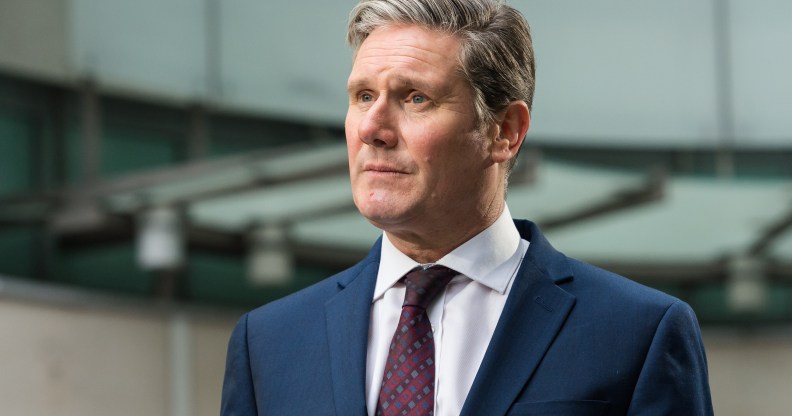Keir Starmer is first Labour leadership candidate to pledge support for trans rights

Keir Starmer has come under fire for saying that 16 is too young for someone to change their gender (Getty)
Keir Starmer warned against trans people being used as a “political football” as he pledged his support for reforms to the Gender Recognition Act.
The shadow Brexit secretary, who is currently the frontrunner to replace Jeremy Corbyn as Labour leader, committed to “protect and defend” LGBT+ rights at a campaign event in Stevenage.
Starmer was asked by a local LGBT+ activist how he would “champion and protect trans rights for people both within the Labour Party out of it”.
In response, he said he was “really worried” that trans people, including non-binary people, are “being used as a political football across the Labour Party”.
“We have to deal with it in a much better way than that,” he said.
Alluding to the government’s inaction following the Gender Recognition Act (GRA) consultation, Keir Starmer suggested that the Tories had “effectively abandoned” GRA reform.
Really refreshing to hear @Keir_Starmer in Stevenage today, championing trans rights and committing to protect them if elected. I hope the other candidates can do the same. #LabourLeadership pic.twitter.com/XoBxuRA5FO
— will roney ?️?? (@williamroney9) January 5, 2020
“Any legislative change I think won’t come under this government, so we’ve got to make the argument on this loud and clear,” he said.
“Let’s start from the position that this is a group – a small group of people who have been subjected to incredible abuse and discrimination for a very, very long time.”
Keir Starmer and Labour leadership hopefuls will set out their vision for LGBT+ rights in coming weeks.
Keir Starmer’s words make him the first candidate to mention trans rights during his leadership campaign, though others have previously made clear their support for the LGBT+ community.
Emily Thornberry is a prominent supporter of LGBT+ rights, and previously defended the rights of trans women to appear on women-only shortlists.
“What I have learned from feminism is there are people who are marginalised and people who are treated badly, and the feminist movement is big enough,” she said during a fierce, protracted debate in 2016.
“We’re big enough and big-hearted enough, and if someone believes that they were born as a man but they are a woman, we have space.”
Jess Philips, who is running under the banner “Speak truth. Win power”, was a prominent voice in the fight against anti-LGBT+ protestors in Birmingham last year.
She was memorably filmed arguing with a a protest leader outside of a Birmingham school, telling him: “I don’t agree that you get to pick and choose which equality you can and can’t have.”
Lisa Nandy came out for LGBT+ rights in September, dismissing reports that the Conservatives were planning to “weaponise” trans rights in northern working class constituencies.
She argued that No 10 had misunderstood such towns, explaining that in her Wigan constituency she had been “inspired by the LGBT+ young people who have had to battle for fair and equal treatment and have shown huge bravery in standing up to discrimination, hostility and bullying.”
“Their response was to set up a Pride parade in the face of some strong resistance only a few years ago,” she wrote for PoliticsHome. “Now the whole town, and every generation, turn out to support it.”
Rebecca Long Bailey, who is yet to formally declare but is considered a likely successor to the Corbyn project, has said little on trans issues since becoming an MP in 2015 but has voted consistently in favour of LGBT+ rights.

